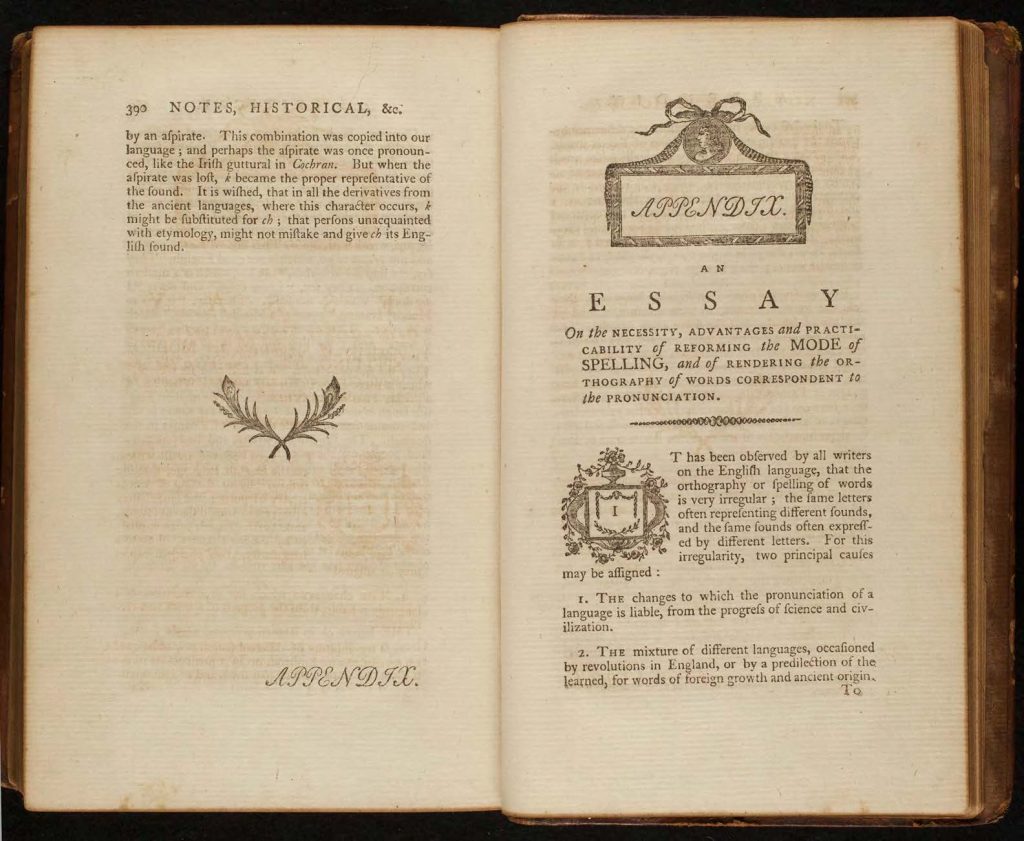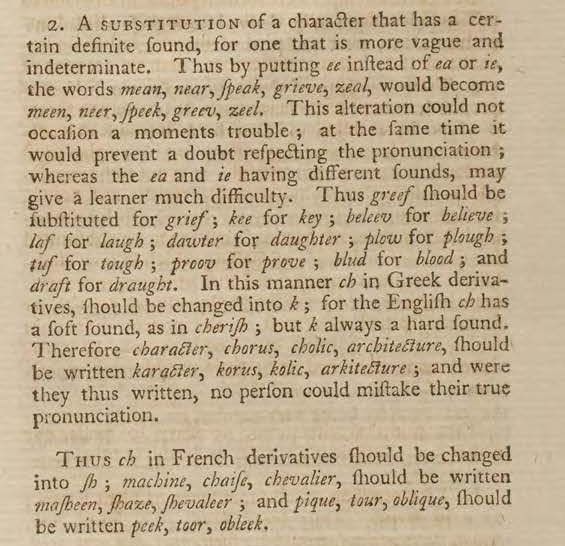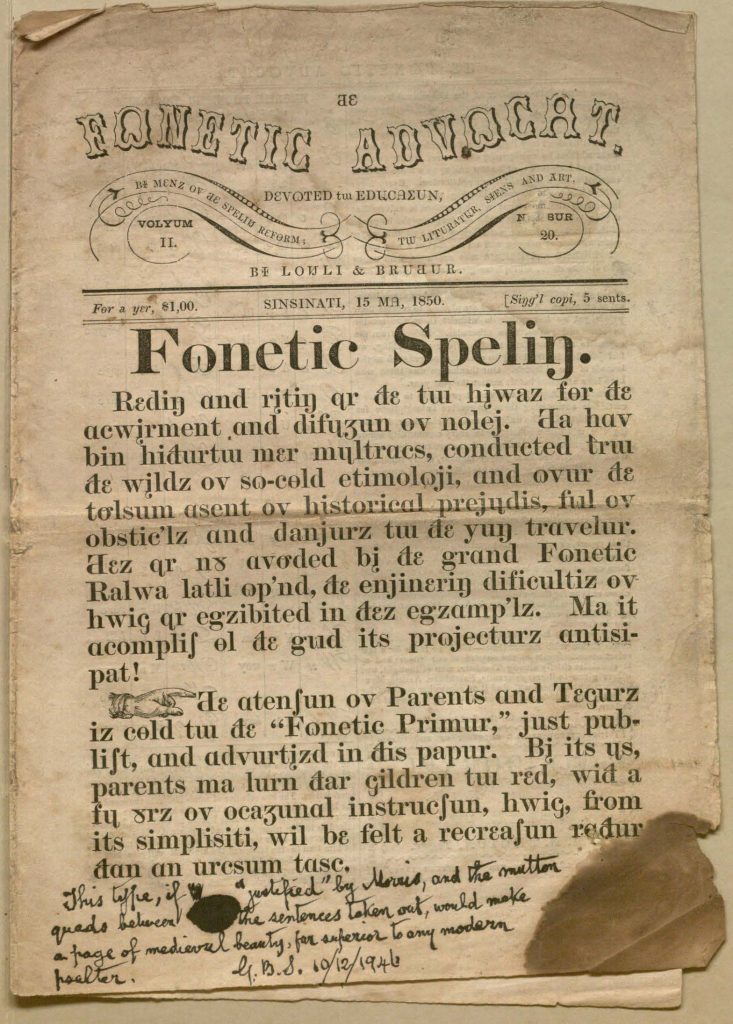How *Do* You Spell That?: Adventures in Spelling Reform
The relationship between the pronunciation of English and its system of spelling (or orthography) is inconsistent at best. Cough and through or great and meat appear as though they should rhyme, but (alas!) do not. Other words are spelled identically, but are pronounced differently according to their meaning, for example, “bow and arrow” vs. “Congratulations! Take a bow.”
Within the American context, Noah Webster is perhaps the figure best known for tackling spelling reform. At the end of his Dissertations on the English Language (1789), he includes an essay addressing this topic. In it, he appeals to national pride (in both the positive and negative senses of that phrase) and asks his readers a rather leading question:
…ought the Americans to retain these faults [in English spelling] which produce innumerable inconveniencies in the acquisition and use of the language, or ought they at once to reform these abuses, and introduce order and regularity into the orthography of the AMERICAN TONGUE?
The revolutionary sentiment of America’s recent War of Independence, it seems, animated Webster’s thinking on orthography as well.
Laying out a revolution in an appendix: Noah Webster’s essay on spelling reform in his Dissertations on the English Language: with Notes, Historical and Critical, to Which Is Added, by Way of Appendix, an Essay on a Reformed Mode of Spelling, with Dr. Franklin’s Arguments on That Subject. Boston: Isaiah Thomas and Company, 1789. Call #: C1514. Click image to enlarge.
Webster’s essay continues by proposing a series of relatively radical alterations. He advocates for 1) the omission of all superfluous or silent letters (changing bread to bred, give to giv, built to bilt, and so on), 2) the replacement of characters with vague or indeterminate sounds by characters with more clearly-defined ones (changing laugh to laf and key to kee), and 3) making a “trifling” alteration to a character in order to help differentiate between sounds (such as adding a “small stroke” across “th” to distinguish between the sounds in “thorn” and “mother”).
Machine vs. Masheen: a passage outlining the second of Noah Webster’s three proposed reforms to American orthography from page 395 of his Dissertations on the English Language […]. Boston: Isaiah Thomas and Company, 1789. Call #: C1514
Although Webster did not ultimately adopt all of these proposals in his subsequent (and immensely popular) grammars and dictionaries, he did aid in establishing several changes that are still with us today. Americans now write of the defense of honor, but for the British, or even our Canadian neighbors (to them, neighbours!), it remains the defence of honour. This national differentiation through orthography was something that Webster considered to be a point in favor of his proposed changes. Webster also argued that his reforms would “facilitate the learning of the language” for both children and non-native speakers alike. They would make it, he asserted in a memorable phrase, “as difficult to spell wrong, as it is now to spell right” (emphasis Webster’s).
Leap ahead 60 years and the Fonetic Advocat (Phonetic Advocate) adopts an even more radical approach to spelling reform than that of Noah Webster. Published in “Sinsinati” (Cincinnati) in the mid-nineteenth century, the periodical announces in the phonetic spelling of its banner that it is “devoted to education by means of the spelling reform to literature, science and art.”
Sound it out? The front page of the Fonetic Advocat. Vol. II, No. 20 (May 15, 1850). Call #: MS P286C:1.
Click image to enlarge.
Its publisher, E. Longley, was the director of the American Phonetic Society. Longley championed the use of the English Phonotypic Alphabet, which had recently been developed in England by Isaac Pitman and Alexander John Ellis. This phonetic alphabet predates and differs from the International Phonetic Alphabet now used by linguists to specify the sounds of spoken language. Try your hand at reading Longley’s front-page proclamation. If you get stuck, click here to consult the phonetic alphabet chart included on the periodical’s next page.
The issue of the Fonetic Advocat shown above bears an interesting provenance. It once passed through the hands of Irish playwright George Bernard Shaw, yet another figure interested in spelling reform. Shaw was so concerned with the subject that he left a bequest to explore the establishment of an alternate phonetic alphabet. Interestingly, Shaw’s manuscript notation at the bottom the front page does not address the issue of phonetic spelling itself, but rather the typeface used for it. He writes, “This type, if ‘justified’ by [William] Morris, and the mutton quads [large spacing type] between the sentences taken out, would make a page of medieval beauty, far superior to any modern psalter.”
Elspeth Healey
Special Collections Librarian
(Adapted from the Summer 2017 exhibition Histories of the English Language).
Tags: Dissertations on the English Language, Elias Longley, Elspeth Healey, Fonetic Advocat, George Bernard Shaw, Histories of the English Lanugage, Noah Webster, Orthography, Phonetic Spelling, spelling



